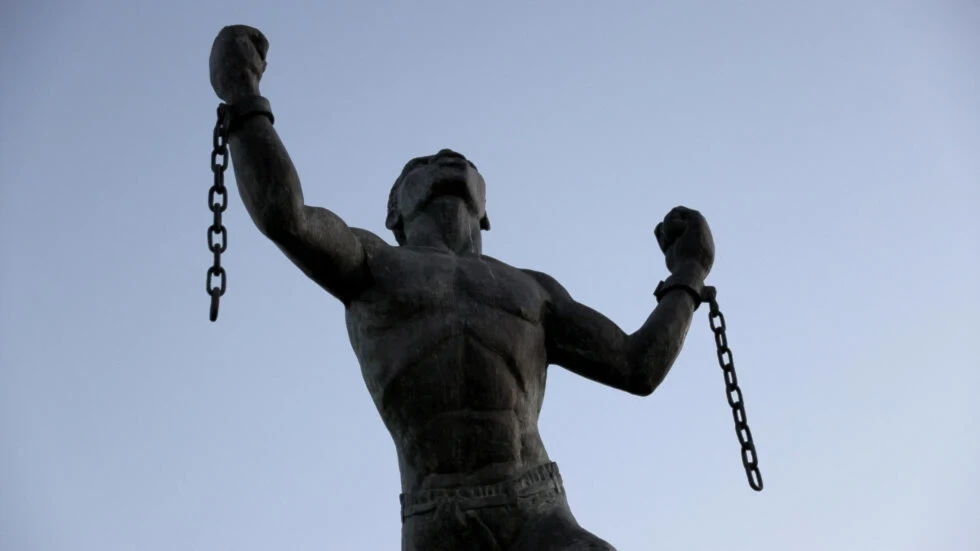Echoes of pain: Ex-French colonies confront slave trade legacy
On the occasion of France's commemoration of the abolition of slavery, individuals from former colonies that are now French overseas departments spoke to RFI about this somber chapter in history.
-

The Emancipation Statue, symbolizing the breaking of the chains of slavery at the moment of emancipation, is seen on November 16, 2021, in Bridgetown, Barbados. (Getty Images via AFP)
A singer from French Guiana emphasized as quoted by RFI the importance of commemorating the abolition of slavery, describing it as a painful chapter in history.
"It's important as it marks a painful chapter of our history. We must not forget," stressed Valérie Tribord.
When questioned by RFI, residents of French Guiana, Guadeloupe, Martinique, and Reunion Island all shared their similar perspectives on the significance of commemorating the day.
Tribord further added that the legislation introduced by Christiane Taubira mandates the inclusion of slavery's history in the curriculum, ensuring that the suffering endured during the colonial era is not forgotten.
"In Guyana, we commemorate the abolition of slavery on 10 June – the day it was officially announced in 1848. However, 10 May is important in ensuring that future generations learn about the slave trade. More and more research on the topic is helping to uncover aspects of slavery we didn't know about," she said.
Frank Salin, a writer and director from Guadeloupe, emphasized the significance of May 23 and May 27 in commemorating the abolition of slavery.
He said as quoted by FRI that he observes May 23 to honor his ancestors and celebrates May 27, a public holiday in Guadeloupe marking the official end of slavery.
For Salin, the duty of remembrance is paramount, particularly as his own ancestor, Jean-Charles Salin, was born a slave. He recalled participating in a silent march with 40,000 French Caribbeans in Paris on May 23, 1998, advocating for the recognition and remembrance of the victims of slavery.
"I'm not saying that 10 May shouldn’t exist, I'm saying that the French should know what happened. When I was at school, we didn't learn about slavery. I had to do my own research up until university. What I do hope is that the stigma attached to being descendants of slaves one day disappears – you know, being ashamed of our skin color and being of African origin. This is because centuries of enslavement conditioned us to see ourselves like the slave owners did," he added.
Reunion Island artist sheds light on maloya and cultural reclamation
Muriel Hillion-Toulcanon, an artist from Reunion Island, expressed that May 10 holds no significance for her, stating she wasn't even aware of its existence. She highlighted December 2 as a pivotal date, marking the official abolition of slavery on the island in 1848.
Hillion-Toulcanon noted the significance of this date, mentioning a week of events commemorating the abolition, known as Fèt Kaf, during which maloya, a music and dance form inherited from enslaved ancestors, takes center stage.
She explained that during slavery, maloya was nearly prohibited, viewed by the church and plantation owners as associated with sorcery. The abolition of slavery liberated maloya, allowing it to express the sufferings of slaves. It wasn't until 1981, under a socialist government, that the unofficial censorship on maloya was lifted. In 2009, when maloya was recognized by UNESCO as an intangible cultural heritage, it gained wider acceptance on the island.
Hillion-Toulcanon noted the transformation in societal attitudes toward slavery, citing the broadcasting of sacred rituals performed during December 20 celebrations on TV, a development that was previously unthinkable.
"Sacred rituals performed during the 20 December celebrations are now even broadcast on TV – that used to be unthinkable," she stressed.
'France’s grim role in the violent slave trade'
On her part, Maddy Orsinet, creole singing school founder, from Martinique said, "I'm not happy with the idea of regrouping the history of slavery in Martinique, Guadeloupe, French Guyana and Reunion under the same 10 May date – as if each territory did not have its specific turbulent history of enslavement. In Martinique, slavery was officially abolished on 22 May 1848."
Orsinet further expressed concerns about the French state's approach to teaching about slavery in all four Creole territories, noting the importance of acknowledging their cultural differences. She compared it to her education about World War I, where certain aspects were overlooked until later. Despite this, Orsinet acknowledged the significance of the official commemorations on May 10, which shed light on France's historical involvement in the violent slave trade and are now mandated by law.
"But the 10 May official commemorations do put an official spotlight on France’s grim role in the violent slave trade. It’s now part of the law of this country and no one can pretend they don’t know what happened," she concluded.
A flashback
Until the abolition of the slave trade in 1848, nearly four million individuals, including men, women, and children, endured lives of enslavement in the French colonies. Today, thousands of French citizens residing in those former colonies are descendants of enslaved individuals.
France observes two days to commemorate slavery: May 10 memorializes the slave trade, slavery itself, and its eventual abolition, while May 23 is designated as a national day to honor the victims of colonial slavery.
In 2001, the French parliament passed the Taubira Law on May 10, officially recognizing the trafficking and enslavement of African, Amerindian, Malagasy, and Indian populations as crimes against humanity. This legislation, proposed by Christiane Taubira, a Socialist lawmaker from French Guiana who later became France's first black justice minister, was subsequently approved by the Senate on May 21.
In 2006, then-President Jacques Chirac signed a decree officially establishing May 10 as a national day of remembrance.
Read more: Algeria: Dotting the I’s in France’s colonial history

 6 Min Read
6 Min Read








